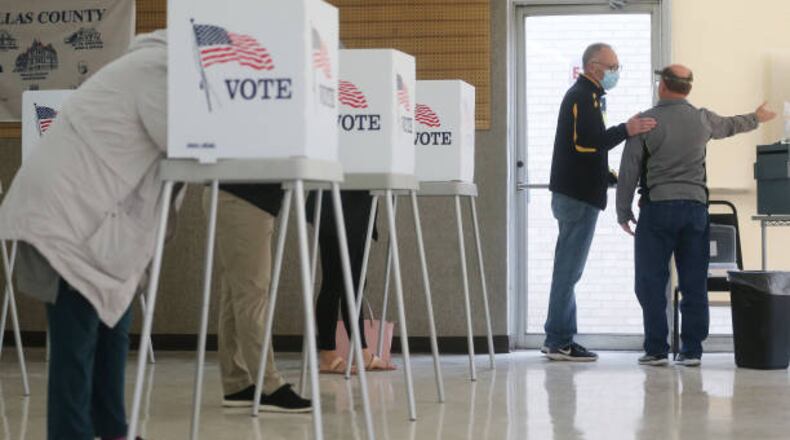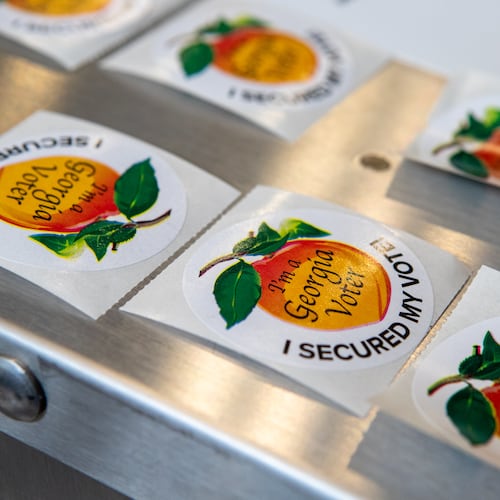On Election Day, as and after results come in, stress and emotions remain top-of-mind regardless of political affiliation.
Sixty days ago, we interviewed Dr. Drew Westen, a professor emeritus of psychology and psychiatry at Emory University and the author of the book “The Political Brain,” who offered tips on what we can do to take a deep breath the rest of this cycle.
At the time, former President Donald Trump had just survived an assassination attempt, and then President Joe Biden dropped out of the race, leaving Vice President Kamala Harris to top the Democratic ticket.
Now as polls close and results come in, we return to Westen to answer more questions on how someone can process the news cycle.
The answers were edited for clarity and brevity.
Q&A: Nov. 5, 2024
What specific tactics can I take to remain calm as results roll in?
Be with people tonight and for the next couple of evenings if you’re really worried about the outcome, especially of the presidential race. Try having a nice dinner and relax before watching the returns as we start to know anything by around 8 p.m. in a handful of states.
How can I use social media healthily?
The chances of our knowing the next president tonight by 11 p.m., the way it used to be, are virtually zero, so any premature victory parties are aimed at creating the impression that, if the other side wins, it must have been fraud, when it just depended on whose votes get counted first.
Don’t worry about results on where 30, 40, or even 90 percent of the votes are in unless the major networks have projected the winners based on statistical models which, unlike polls, are virtually always accurate because the networks and major news outlets will not typically project races until the data are so clear.
How do I talk to my co-workers, friends and family about the results, even if they’re on the other side of the aisle?
Use humor as much as possible, especially gallows humor if your side is losing. Avoid what you think might be humorous but to a friend or family member on the other side of the aisle might seem like taunting. That’s a 15-year penalty in football and a really unpleasant Thanksgiving dinner in three weeks if they are family.
How can I talk to my kids about the results?
Be as honest as you can, while making sure your answers are age-appropriate.
–
Originally published Q&A, Sept. 6:
Q: So what do you see as the political and emotional landscape right now through your lens?
A: So you’ve got on the one hand, you’ve got polarization, (and) on the other, you also have violent rhetoric, which has not been part of our political discourse in a long time. The last time we saw something like that, it was left-wing violent rhetoric in the 1960s, along with the anti-war movement. And then the other piece obviously is the silo organization that’s come along with social media and you know that’s only getting worse with (artificial intelligence) and with what can be done with AI. So when you put those things together and add that, I guess, the fact that everyone now is connected all the time in one way or another, even if they’re not politically interested or active, they’re getting stuff on their feeds from, you know, if they’re 50 and above, Facebook, if they’re 25 and below, TikTok. Wherever they’re getting it from, they’re getting it all the time.
Q: You write in your book “The Political Brain” that when it comes to issues and policies, it’s a gut feeling. Can you expand on that?
A: I think what lies behind where the anxiety is coming from now is this isn’t a normal election. You know, frankly, I was involved pretty heavily in (Barack Obama’s) campaign and on the messaging side at certain moments. But in 2012, you know what, if Mitt Romney had gotten elected, and if President Obama hadn’t gotten reelected, I would have been unhappy about it, but I wouldn’t have thought, “Oh, well, there goes our republic.” It would be like, all right. So we’re going to have, more tax cuts for the rich in the next four years and that’s life. But I don’t think there are many people in the last, oh, I don’t know, a couple of decades who thought that the world was going to crumble if the other side won. I mean, you feel like that until the day after the election, then you go, “You know what, back to my normal life. I’m going back to work and I voted and my vote either worked or didn’t work, and you know, that’s how it is.”
Q: We all have that one co-worker or that one aunt or uncle that we just don’t agree with at all in politics. We have to see and engage with these people every day between now, November and beyond. So how can people engage in civil discourse when you’ve outlined all this rhetoric? How do we cut back?
A: It’s a great question because very few of us are listening now. You know, most of us are talking to people who agree with us and not talking with people who don’t. You know, I think a good rule of thumb for people right now is I if you want to try to engage someone, say a family member who’s on the opposite pole that you’re on, don’t bother. You’re not going to convince them. The best you can do is to say to them and say to yourself, “You know what, when Nov. 5 and whatever follows, however long it takes to count, the ballgame is over. We’re still going to be here.
Q: What are some parting words you can give just everyday voters to make it and hold on in about the 60 days between now and November?
A: One thing that we know tends to reduce anxiety is when people take a sense of agency over their lives. And I’ve never felt like this in an election before that this could make a difference in mental health. But I think educating yourself and making sure that you vote no matter what, and that, you know, in advance I’m going to vote and I’m going to talk to the people around me about why I think it’s important that they vote, I think that’s something that actually might make people feel a little bit better because it makes you feel like at least there’s something I can do. You know, it’s funny: You never think about voting as an anti-anxiety pill. I can tell you in my own life and in stressful times, it’s been really helpful just to remember to have the courage to change what you can, like vote; the serenity to accept what you can’t, like how other people are going to vote; and the wisdom to know the difference.
Tuesday on “Politically Georgia”: Gabe Sterling, the chief operating officer of the secretary of state’s office, will talk about the candidates on the Georgia ballot. Then, The Atlanta Journal-Constitution’s Katherine Landergan talks about her investigation into the Georgia Vocational Rehabilitation Agency helping disabled Georgians.
About the Author
Keep Reading
The Latest
Featured






